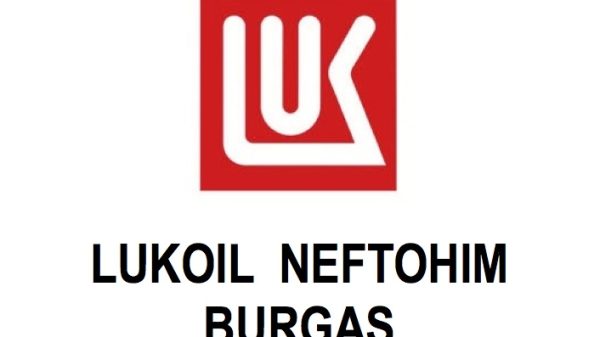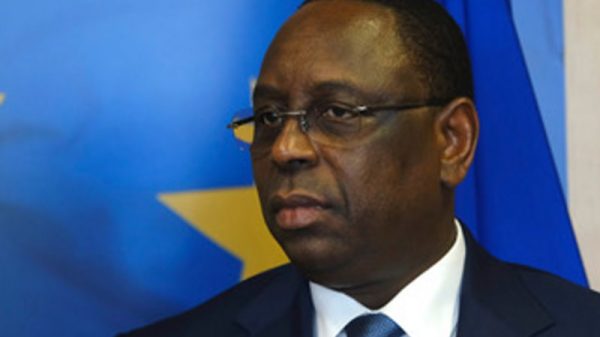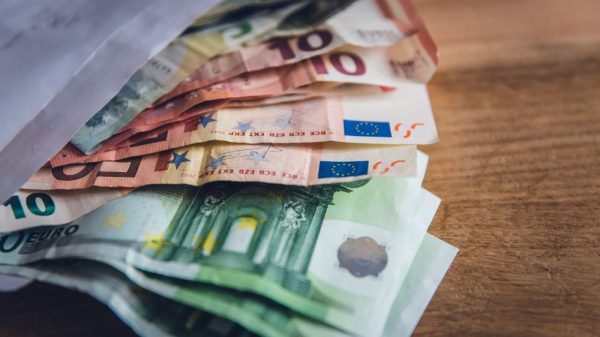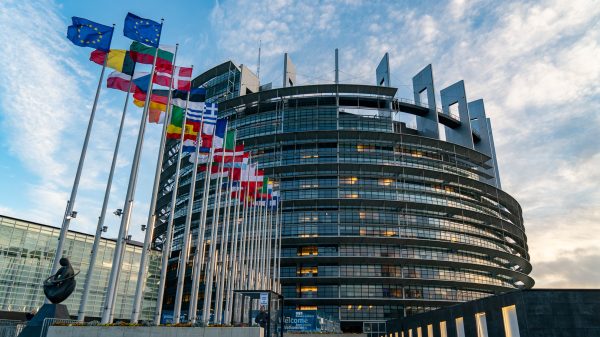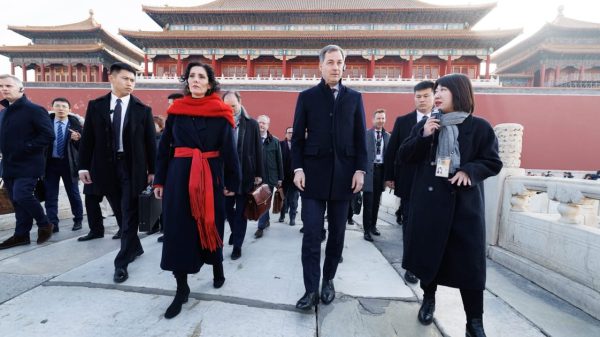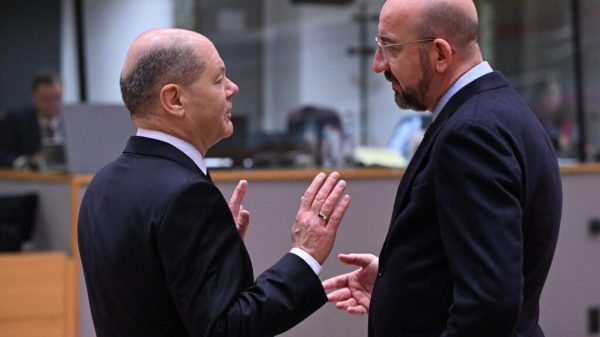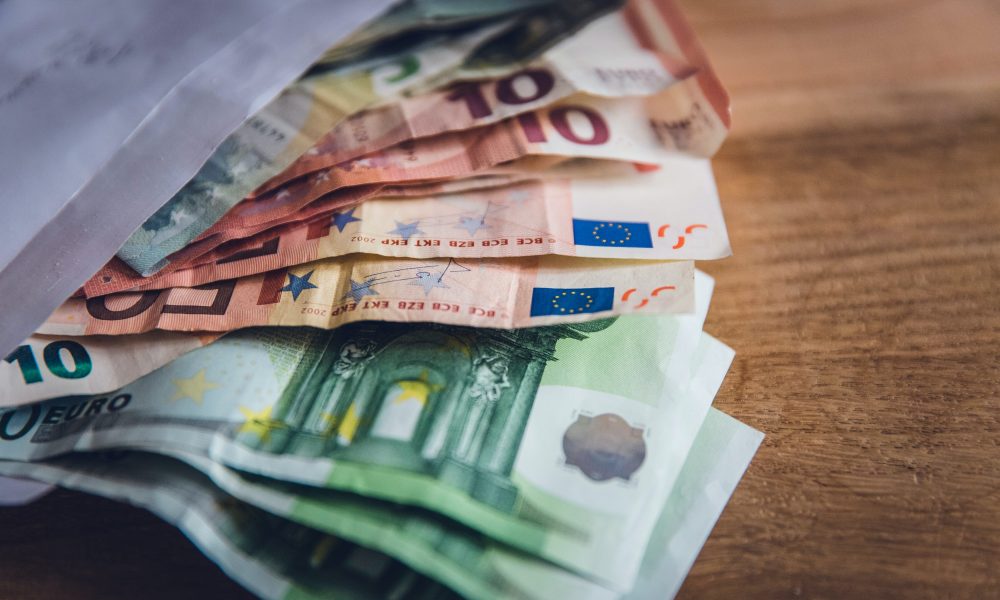
- The fortunes of the EU’s five richest men reached almost 430 billion euros last year, more than half of the EU countries’ education budget.
- Oxfam predicts the world could have its first-ever trillionaire in just a decade while it would take more than two centuries to end poverty.
- A wealth tax on EU multi-millionaires and billionaires could raise 390 billion euros each year, more than half the EU’s recovery fund.
The EU’s five richest billionaires increased their wealth by 76 per cent since 2020, from 244 billion euros to 429 billion, at a rate of 5.7 million euros per hour, Oxfam reveals today. At the same time, 99 per cent of the EU’s population has become poorer. These findings are based on Oxfam’s new report on inequality and global corporate power. The report also reveals that if current trends continue, the world will have its first trillionaire within a decade, but poverty will not be eradicated for another 229 years.
“Inequality Inc.”, published today as business elites gather in the Swiss resort town of Davos, unveils that seven out of ten of the world’s biggest corporations have a billionaire as CEO or principal shareholder. These corporations are worth 9.3 trillion euros, equivalent to more than the combined GDPs of all countries in Africa and Latin America.
“We’re witnessing the beginnings of a decade of division, with billions of people shouldering the economic shockwaves of pandemic, inflation and war, while billionaires’ fortunes boom. This inequality is no accident; the billionaire class is ensuring corporations deliver more wealth to them at the expense of everyone else,” said Oxfam International interim Executive Director Amitabh Behar.
AdvertisementDespite representing less than 6 percent of the global population, the EU hosts 15 percent of the world’s billionaires and 16 percent of global billionaire wealth. Since 2020, billionaires in the EU increased their accumulated wealth by one-third, reaching 1.9 trillion euros last year.
A progressive wealth tax on EU multi-millionaires and billionaires between 2 and 5 percent could raise 390 billion euros each year. This could pay more than half the EU’s recovery fund.
“Literally, every hour that governments fail to act is worth millions, and the EU is no exception. A European wealth tax is vital to stop us from falling into a new age of billionaire supremacy. By fairly taxing Europe’s richest, the EU holds the key to start narrowing the chasm between them and the rest of us,” said Chiara Putaturo, Oxfam’s EU tax expert.
Mirroring the fortunes of the super-rich, 22 of some of the biggest companies in the EU made 172 billion euros in net profit from July 2022 to June 2023. This is 66 percent more than their average profit for 2018 – 2021.
Advertisement
“Runaway corporate and monopoly power is an inequality-generating machine: through squeezing workers, dodging tax, privatizing the state, and spurring climate breakdown, corporations are funneling endless wealth to their ultra-rich owners. But they’re also funneling power, undermining our democracies and our rights. No corporation or individual should have this much power over our economies and our lives —to be clear, nobody should have a billion dollars”, said Behar.
An example of a modern monopoly man in the EU is the world’s second richest man, the French billionaire Bernard Arnault. He presides over the luxury goods empire LVMH, an umbrella of brands like Christian Dior, Louis Vuitton and Chandon. The group has been fined by France’s anti-trust body. He also owns France’s biggest media outlet, Les Échos, as well as Le Parisien.
Oxfam’s report also shows a “war on taxation” by corporations. In the EU, the corporate tax rate fell from 32.2 percent in 2000 to 21.5 percent in 2023. Globally, only 4 percent of the 1,600 largest companies publicly disclose their global tax strategy and corporate income taxes paid in all countries.
People worldwide are working harder and longer hours, often for poverty wages in precarious and unsafe jobs. The wages of nearly 800 million workers have failed to keep up with inflation and they have lost 1.4 trillion euros over the last two years, equivalent to nearly a month (25 days) of lost wages for each worker.
“Every corporation has a responsibility to act but very few are. Governments must step up. There is action that lawmakers can learn from, from US anti-monopoly government enforcers suing Amazon in a landmark case, to the European Commission wanting Google to break up its online advertising business, and Africa’s historic fight to reshape international tax rules”, said Behar.
Notes to editors
Download Oxfam’s report “Inequality Inc.” and the methodology note.
Chiara Putaturo is available for interview and comment.
Based on the same methodology as the report, Oxfam calculated that:
- The five richest billionaires in the EU have increased their wealth by more than three quarters (75.9 percent)— from 244.2 billion euro in March 2020, adjusted for inflation, to 429.43 billion euro in November 2023. That is equivalent to 57 percent of the EU countries’ education budget (760 billion euro). This is an increase of 185 billion euros, equivalent to 5.7 million euros every hour from 18March 2020 to 30 March 2023. Oxfam’s calculations for the education budget are based on the Oxfam Commitment to Reducing Inequality Index 2022 and use the last data available from countries, in most cases from 2020 or 2021.
- Billionaires’ wealth in the EU has increased by 33 percent from 2020 to November 2023 (from 1.44 trillion euros, adjusted for inflation, to 1.92 trillion euro). The data does not include Croatia, Latvia, Lithuania, Luxembourg, Malta and Slovenia.
- A progressive wealth tax on the EU’s multi-millionaires and billionaires at a rate of 2 percent on net wealth above 4.6 million euro, 3 percent on net wealth over 45.7 million euro, and 5 percent on wealth above 913 million euro could generate 390 billion euros each year, enough to cover more than half of the EU recovery and resilient facility (723.8 billion euro). The data does not include Croatia, Cyprus, Estonia, Latvia, Lithuania, Malta and Slovakia.
- 99 percent of the EU’s population (around 443 million people) held 5.6 percent less wealth in real terms in 2022 compared to 2019, from 57 billion euro to 54 billion euro.
- Despite representing less than 6 percent of the global population, the EU hosts 15 percent of the world’s billionaires (391 out of 2,566) and 16 percent of the global billionaires’ wealth (1.9 trillion euro out of 11.7 trillion). The data on billionaires and wealth does not include Croatia, Latvia, Lithuania, Luxembourg, Malta and Slovenia.
- The richest 1 percent holds 56 percent of the total financial wealth in Europe. Financial wealth/assets include bank deposits, stocks, bonds, and loans and the figure refers to Europe, as per the UN definition, which also includes countries like Russia, Norway and the UK.
- Twenty-two of the world’s biggest corporations headquartered in the EU made 172 billion euro in net profits for the year to June 2023, which is 66 percent higher than their average profits for 2018– 2021 (103.6 billion euro).
- Just 4 percent of the over 1,600 largest and most influential companies sampled worldwide fully meet the World Benchmarking Alliance’s social indicator on responsible tax, by having a public global tax strategy and publicly disclosing corporate income taxes paid in all countries.
All calculations were made in US dollars and converted on OANDA on 9 January 2024.
It will take 229 (almost 230) years to ensure the number of people living under the World Bank poverty line of 6.26 euros will be reduced to zero.
According to the IMF’s World Economic Outlook Database, the combined GDP of economies in Africa in 2023 is 2.62 trillion euros, while that of countries in Latin America and the Caribbean is 5.96 trillion euros, for a total of 8.58 trillion euros.
According to the OECD, in the EU countries, the statutory corporate tax rate fell from 32.2 percent in 2000 to 21.5 percent in 2023.
Oxfam is calling on governments to rapidly and radically reduce the gap between the super-rich and the rest of society by:
- Revitalizing the state. A dynamic and effective state is the best bulwark against extreme corporate power. Governments should ensure universal provision of healthcare and education, and explore publicly-delivered goods and public options in sectors from energy to transportation.
- Reining in corporate power, including by breaking up monopolies and democratizing patent rules. This also means legislating for living wages, capping CEO pay, and new taxes on the super-rich and corporations, including permanent wealth and excess profit taxes. Oxfam estimates that a wealth tax on the world’s millionaires and billionaires could generate $2.5 trillion a year.
- Reinventing business. Competitive and profitable businesses don’t have to be shackled by shareholder greed. Democratically-owned businesses better equalize the proceeds of business. If just 10 percent of US businesses were employee-owned, this could double the wealth share of the poorest half of the US population, including doubling the average wealth of Black households.
Oxfam has launched a global petition to Make Rich Polluters Pay and is supporting, together with politicians, economists like Thomas Piketty and multi-millionaires like Marlene Engelhorn, a European Citizens Initiative for a European wealth tax.
Photo by Markus Spiske on Unsplash
Share this article:





